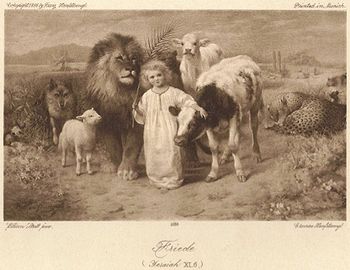
Hawkins / Frieden
Inhaltsverzeichnis: (verbergen)
 Friedensreich, Illustration, 19. Jht. |
|
Der Frieden kommt durch Verständigung, nicht durch Vereinbarung. |
|
Göttlicher Frieden – einhergehend mit dem Zustand der Erleuchtung –
Pax ist das lateinische Wort für Frieden. Pax in Verbindung Reichs-, Völker- oder Ortsnamen steht für Konzepte weltanschaulicher Macht und politischer Einflussnahme im Sinne des Namensgebers oder von konkreten Friedens- |
Personal avowals
Gloria Steinem, Gregg Braden, Richard Wilkinson, Ph.D., Marija Gimbutas, estimate:
There were 90% non-war periods, 10% war periods in human history.
* * *
Der erste Frieden ist der Wichtigste.
Er ist es, der in die Seelen der Menschen einzieht, wenn sie ihre Verwandtschaft, ihr Einssein,
mit dem Universum begreifen und verinnerlichen, dass das große Geheimnis im Mittelpunkt der Welt wohnt
und diese Mitte tatsächlich überall ist. Sie ist in jedem von uns.
Dies ist der wirkliche Friede, alle anderen sind lediglich Widerspiegelungen davon.
Der zweite Friede wird zwischen Einzelnen geschlossen.
Und der dritte Friede ist der zwischen den Völkern.
Doch vor allem möget ihr verstehen, dass es niemals Frieden geben kann, solange nicht
der erste Friede vorhanden ist, welcher, wie ich schon so oft sagte, im Innern der Menschenseele wohnt.
Black Elk [Hehaka Sapa = Schwarzer Elch] [BW 499] (1863-1950), Drei Arten von Frieden
| Black Elk war ein Wichasha Wakan, ein Medizinmann und Ältester der Oglala-Lakota-Indianer. Im Jahre 1876 nahm er mit erst zwölf Jahren an der Schlacht am Little Bighorn River teil. Das Massaker am Wounded Knee 1890 überlebte er schwer verletzt. Er war ein Cousin von Crazy Horse und kannte Sitting Bull und Red Cloud. Obwohl er kein Englisch sprach, hat er viel von der Welt des Weißen Mannes gesehen. Mit der "Buffalo Bill Wild West Show" ist er nach Italien, Frankreich und England gereist, wo er unter Anderem für Königin Victoria tanzte. Black Elk ver- fügte über große spirituelle Kraft und inspirierte sein Volk und viele andere weltweit. |
Persönliche Bekenntnisse
Kurz bevor ein Rechtsextremist tödlichen Schüssen auf ihn abgefeuert hat
Zukunftsaussichten
Empfehlung
Friedens-Deklaration der Quäker aus dem 17. Jahrhundert
Schlussfolgerung
Einsicht
Der Physiker Einstein war während des Ersten Weltkriegs aktiv in der Anti-Kriegsbewegung.
Baruch Spinoza legte das Fundament für die Aufklärung des 18. Jahrhunderts. Als einer der Begründer der modernen Bibelkritik
wird dem Rationalismus des 17. Jahrhunderts zugeordnet.
|
Personal avowals
Appeal
Recommendations
Future prospect
Insights
By laying the groundwork for the 18th-century Enlightenment and modern biblical criticism, including modern conceptions of the self and, arguably, the universe, Spinoza came to be considered one of the great rationalists of 17th-century philosophy.
See also: YouTube clip Truman speech – Potsdam Conference – July 20, 1945, 0:20 seconds, posted 27. March 2009
|
Song text
Muted as a result of a stroke and bound to his death bed Hurr wrote this message:
The True Peace
The first peace, which is the most important,
is that which comes within the souls of people when they realize their relationship,
their oneness with the universe and all its powers, and when they realize
at the center of the universe dwells the Great Spirit,
and that its center is really everywhere, it is within each of us.
This is the real peace, and the others are but reflections of this.
The second peace is that which is made between two individuals,
and the third peace is that which is made between two nations.
But above all you should understand that there can never be peace between nations
until there is first known that true peace which is within the souls of men.'''
| Source: ► Black Elk ['Wičháša Wakȟáŋ; Hehaka Sapa'] [LoC 499] (1863-1950) North American medicine elder and heyoka of the Oglala Lakota tribe (Sioux) of the Oglala Lakota (Sioux), Catholic katechist, Pine Ridge reservation, South Dakota, The Sacred Pipe. Black Elk's Account of the Seven Rites of the Oglala Sioux, 1953 |
| See also: ► Poems |
|
If there is to be peace in the world, |
| Source: ► Tao Te Ching [The Book of the Way] 800-200 BC |
| See also: ► Poems |
Links zum Thema Frieden / PeaceFriedensgedenk- und Aktionstage – Veranstaltungen
LiteraturLiterature (engl.)
Externe Weblinks
External web links (engl.)
7,500 people across European Union were polled. Israel (with 59%) was ranked on top of the list of the most dangerous states worldwide – followed by Iran, North Korea und the United States. 65% of the Germans who were questioned considered both Israel and North Korea a threat to world peace. The poll sparked outrage in Israeli government circles, followed by criticism and attacks on the Commission that ordered it, from the inter-
Audio- und Videolinks
Audio and video links (engl.)
Two peace educators from Israel and Palestine created a dual-narrative history-teaching textbook.
Linkless media offering
Peace education in the Middle East conflict
|
Wiki-Ebene
Englisch Wiki